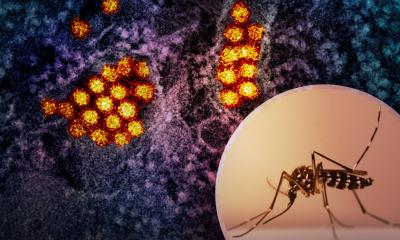Swine flu spreads
Swine flu has been confirmed in a number of countries and it is spreading from human to human, which could lead to what is referred to as a pandemic flu outbreak.
Pandemic flu is different from ordinary flu because it's a new flu virus that appears in humans and spreads very quickly from person to person worldwide. On Wednesday, the World Health Organization raised the pandemic threat Level to 5 out of 6.

The novel influenza virus A (H1N1)
The novel influenza virus (human swine influenza A(H1N1)) that has now been found contains genes from pig, bird and human influenza viruses, in a combination that has never been observed before anywhere in the world. In addition there is every indication that this virus has been transmitting from human to human and the resulting illnesses have been severe in a substantial number of cases in Mexico.
People become infected with novel influenza virus A(H1N1) in the same way as for normal seasonal influenza. It spreads from person to person via droplets from an infected person who is coughing and sneezing; indirectly when droplets or secretions from the nose and throat settle on objects (including hands) which then are touched by other people who touch their own mouth or nose.
Symptoms of novel influenza A(H1N1) in humans are usually similar to regular human seasonal influenza symptoms, involving fever of sudden onset and respiratory symptoms; diarrhoea might also occur. However, severe complications could occur even in normally healthy persons who become infected with the virus. The virus that is now being detected is susceptible to neuraminidase inhibitors but resistant to amantadines.
European response
All EU Member States have implemented appropriate response measures in order to limit the spread of this infection to the continent. These include the provision of information to the general public and to travellers, and raising the alert on this situation among the healthcare workers. In addition, several Member States have implemented enhanced surveillance and/or activated their national pandemic preparedness plan. On a European level, the implementation of these measures is coordinated by the European Commission.
WHO statement
"Influenza pandemics must be taken seriously precisely because of their capacity to spread rapidly to every country in the world," stated WHO Director-General, Dr Margaret Chan. Swine flu is a new virus, so the flu vaccination given each year does not give protection. Everyone could be at risk of catching it. WHO advises no restriction of regular travel or closure of borders. It is considered prudent for people who are ill to delay international travel and for people developing symptoms following international travel to seek medical attention, in line with guidance from national authorities.
There is also no risk of infection from this virus from consumption of well-cooked pork and pork products. Individuals are advised to wash hands thoroughly with soap and water on a regular basis and should seek medical attention if they develop any symptoms of influenza-like illness
"The biggest question, right now, is this: how severe will the pandemic be, especially now at the start? It is possible that the full clinical spectrum of this disease goes from mild illness to severe disease. We need to continue to monitor the evolution of the situation to get the specific information and data we need to answer this question."
Picture: pixelio/Miguel Carulla
30.04.2009





